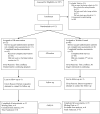A randomized controlled trial of The Body Project: More Than Muscles for men with body dissatisfaction
- PMID: 28481431
- PMCID: PMC5538920
- DOI: 10.1002/eat.22724
A randomized controlled trial of The Body Project: More Than Muscles for men with body dissatisfaction
Abstract
Objective: Pressures for men to conform to a lean, muscular ideal have, in part, contributed to eating disorder and muscle dysmorphia symptoms, yet few programs have been developed and empirically evaluated to help men. This study investigated the acceptability and efficacy of a cognitive dissonance-based (DB) intervention in reducing eating disorder and muscle dysmorphia risk factors in men with body dissatisfaction.
Method: Men were randomized to a two-session DB intervention (n = 52) or a waitlist control condition (n = 60). Participants completed validated measures assessing eating disorder risk factors preintervention, postintervention, and at 1-month follow-up.
Results: Program ratings indicated high acceptability. The DB condition demonstrated greater decreases in body-ideal internalization, dietary restraint, bulimic symptoms, drive for muscularity, and muscle dysmorphia symptoms compared with controls (p values < .02; between-condition Cohen's d = .30-1.11) from pre- to postintervention. At one-month follow-up, the DB condition demonstrated significantly lower scores for all variables (p values < .03; between-condition d = .29-1.16). Body-ideal internalization mediated intervention outcomes on bulimic and muscle dysmorphia symptoms.
Discussion: Results support the acceptability and efficacy of The Body Project: More Than Muscles up to 1-month postintervention and should be examined against active control conditions.
Keywords: body dissatisfaction; dissonance; eating disorder; intervention; men; muscle dysmorphia; peer-led.
© 2017 Wiley Periodicals, Inc.
Figures
Similar articles
-
Men, Muscles, and Eating Disorders: an Overview of Traditional and Muscularity-Oriented Disordered Eating.Curr Psychiatry Rep. 2017 Jun;19(6):32. doi: 10.1007/s11920-017-0787-5. Curr Psychiatry Rep. 2017. PMID: 28470486 Free PMC article. Review.
-
Dissonance-based eating disorder prevention delivered in-person after an online training: A randomized controlled trial for Brazilian men with body dissatisfaction.Int J Eat Disord. 2021 Mar;54(3):293-304. doi: 10.1002/eat.23423. Epub 2020 Dec 4. Int J Eat Disord. 2021. PMID: 33275811 Clinical Trial.
-
Dissonance-Based Eating Disorder Prevention for Body-Dissatisfied Brazilian Cisgender Gay and Bisexual Men: A Randomized Controlled Trial With a 1-Year Follow-Up.Int J Eat Disord. 2024 Sep;57(9):1924-1935. doi: 10.1002/eat.24246. Epub 2024 Jul 3. Int J Eat Disord. 2024. PMID: 38958485 Clinical Trial.
-
A randomized controlled trial of a peer co-led dissonance-based eating disorder prevention program for gay men.Behav Res Ther. 2015 Nov;74:1-10. doi: 10.1016/j.brat.2015.08.008. Epub 2015 Sep 3. Behav Res Ther. 2015. PMID: 26342904 Clinical Trial.
-
Muscle dysmorphia: could it be classified as an addiction to body image?J Behav Addict. 2015 Mar;4(1):1-5. doi: 10.1556/JBA.3.2014.001. J Behav Addict. 2015. PMID: 25592218 Free PMC article. Review.
Cited by
-
The association between muscle dysmorphia and eating disorder symptomatology: A systematic review and meta-analysis.J Behav Addict. 2019 Sep 1;8(3):351-371. doi: 10.1556/2006.8.2019.44. Epub 2019 Sep 11. J Behav Addict. 2019. PMID: 31505966 Free PMC article.
-
The global prevalence of screen-based disordered eating and associated risk factors among high school students: systematic review, meta-analysis, and meta-regression.J Eat Disord. 2023 Aug 3;11(1):128. doi: 10.1186/s40337-023-00849-1. J Eat Disord. 2023. PMID: 37537604 Free PMC article. Review.
-
Men, Muscles, and Eating Disorders: an Overview of Traditional and Muscularity-Oriented Disordered Eating.Curr Psychiatry Rep. 2017 Jun;19(6):32. doi: 10.1007/s11920-017-0787-5. Curr Psychiatry Rep. 2017. PMID: 28470486 Free PMC article. Review.
-
Sexual Orientation, Peer Influence, Body Dissatisfaction, and Eudaimonic Well-Being in Italian Men.Front Psychol. 2019 Aug 8;10:1843. doi: 10.3389/fpsyg.2019.01843. eCollection 2019. Front Psychol. 2019. PMID: 31440194 Free PMC article.
-
Efficacy and cost-effectiveness of Internet-based selective eating disorder prevention: study protocol for a randomized controlled trial within the ProHEAD Consortium.Trials. 2019 Jan 30;20(1):91. doi: 10.1186/s13063-018-3161-y. Trials. 2019. PMID: 30700318 Free PMC article.
References
-
- Becker CB, Smith LM, Ciao AC. Reducing eating disorder risk factors in sorority members: A randomized trial. Behavior Therapy. 2005;36:245–253. doi: 10.1016/S0005-7894(05)80073-5. - DOI
-
- Becker CB, Smith LM, Ciao AC. Peer-facilitated eating disorder prevention: A randomized effectiveness trial of cognitive dissonance and media advocacy. Journal of Counseling Psychology. 2006;53:550. doi: 10.1037/0022-0167.53.4.550. - DOI
-
- Bramon-Bosch E, Troop NA, Treasure JL. Eating disorders in males: a comparison with female patients. European Eating Disorders Review. 2000;8:321–328. 10.1002/1099-0968/(200008)8:4<321::AID-ERV355>3.0.CO;2-G.
Publication types
MeSH terms
Grants and funding
LinkOut - more resources
Full Text Sources
Other Literature Sources
Medical
Miscellaneous


